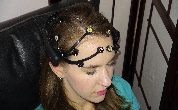
The future in tinnitus treatment
Home

Call us on +61 8 8333 1010



Ten Important Management Strategies
________________________________
Apply these simple techniques to manage your tinnitus and reduce your level of tinnitus perception.

Call us on +61 8 8333 1010
Hypnosis is a highly focussed state of attention during which we can perceive and experience things differently. In our daily life we often experience this highly focussed and somewhat detached state, for example, when we are day dreaming or absorbed in a book, or the computer, or watching TV or a film.
But when hypnosis is used in the clinical setting, it can help us to make changes we want to achieve by building skills and strengthening inner resources to overcome particular difficulties and problems. So the contemporary understanding of hypnosis is that it is a natural ability we all have (to a greater or smaller extent as we are all different) that we can use in a clinical setting to make desired changes.
With the development of knowledge in the field of neuro-
But what we do know is that when we are focused in this way, we can be especially responsive to new ideas and possibilities that can help us make desired changes. That is, when we are in hypnosis, we are more receptive to suggestions.
Most importantly, however, there are studies (see Resources) which show that hypnosis can be effective in the treatment and management of tinnitus; whilst research into hypnosis and tinnitus is not extensive, it is encouraging and consistent with feedback received to date from our tinnitus clients. Hypnosis can help people with tinnitus become less distressed about the tinnitus and more positive and skilled at managing it. It can sometimes also help with reducing the experience of the tinnitus.
Home
Is hypnosis like being asleep or unconscious?
No, hypnosis is not sleep or being unconscious but generally when used clinically, people are likely to be very relaxed while in hypnosis.
Does the practitioner have power over clients, and can they be made to do things they would not normally do?
No, this myth comes from people seeing stage hypnosis, where subjects are often chosen because of their extreme willingness to go along with the show. In a clinical setting, the purpose of using hypnosis is to help clients achieve their goals, and the relationship between the client and practitioner is one of collaboration and care, not control by the practitioner.
Can everyone be hypnotised?
Most people are capable of experiencing hypnosis and using it for their own positive purposes. Some people are extremely responsive; some are less responsive, but most people will benefit from hypnosis with a trained and skilled practitioner.
Is hypnosis simply relaxation?
No, hypnosis is not just relaxation, although often, when in hypnosis, the person may feel particularly relaxed. However, in hypnosis, the client is mentally active and processing what is being said to them. Also, it is possible to be in hypnosis whilst being physically active. For example, runners can have the experience of "zoning out" whilst running; they are working hard physically, but their minds are highly focused on something else, such as music. There are other examples in war, or sports, where people can lose awareness of pain whilst physically active.
Is hypnotherapy the same as hypnosis?
Although some practitioners refer to themselves as hypnotherapists, hypnosis is really a tool that can be used to deliver or reinforce a particular therapeutic approach. The research shows that hypnosis enhances the outcomes achieved using cognitive behavioural therapy and other psychological therapies. Clinicians find that with the addition of hypnosis, similar or better results are achieved, and in a much shorter time frame.





